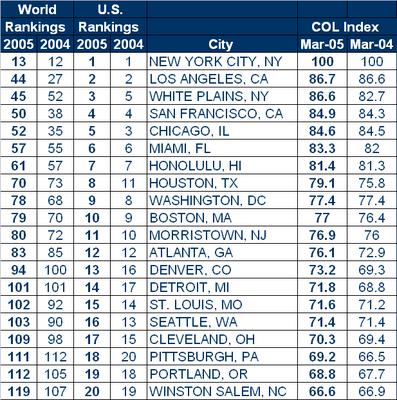Economics: Annual Cost of Living Survey
A global ranking of the world's costliest cities has been released. A full chart of the rankings can be found here. My native home of New York City is the "baseline" - with a score of 100 - which all other cities are ranked against. (More proof for my theory that there are precisely two places on this earth - New York City, and everywhere else).
The most expensive city in the world is Tokyo, with a score of 130.7. My adobted home of Washington, DC is ranked way down at number 78 in the world, with a score of 77.4.
What are the most expensive American cities, and what does this say about America...
The most expensive city in the world is Tokyo, with a score of 130.7. My adobted home of Washington, DC is ranked way down at number 78 in the world, with a score of 77.4.
What are the most expensive American cities, and what does this say about America...

Note that White Plains NY and Morristown NJ are both suburbs of New York City.
Based on various news stories, I had been under the impression that Washington DC was the third or fourth most expensive place to live, after NYC, Los Angeles, and maybe San Francisco. But it turns out that Chicago, Miami, and Honolulu are consistently more expensive then DC, and Houston is on about the same.
This is nuts. Right now, it costs at least $500,000 for a three bedroom condo in an edgy part DC. If you want to live in a nice part of town, it can easily cost you over $1,000,000. It is now utterly impossible for a family earning less then $100,000 a year to buy a home and live in DC, unless you want to live in the most crime ridden neighborhoods with the worst school districts. If NYC is 22.6% more expensive, how does anyone afford to live there any more?
Keep in mind that median household income in the U.S. is around $40,000.
Once upon a time, there were exclusive neighborhoods where only the rich could dwell - Georgetown, Bethesda, the Upper East Side, or Bayside. Then whole subdivisions of the major cities became unaffordable - all of Northwest DC, all of Manhattan. Now, entire cities have become gentrified - all of New York City, all of DC, all of San Francisco. It's only a matter of time before the ghettos, the last vestiges of low income housing within these cities, are chased out of existence. Perhaps that's a good thing. I'm certainly no fan of concentrated poverty. But income levels are NOT RISING. Quite the opposite is true - poverty is rising. So where does the working class go?
My guess - the inner suburbs. This could radically shift the politics in this country. States like Illinois and New Jersey have gone from swing states to deep blue, as the "collar counties" around major cites have seen expanding numbers of minorities and had to come up with collective, government oriented solutions to poverty, education, transportation, health care, etc. The Southern and Western states, with far more physical land to spread people out over, are now ruled by the deep red exurbs. They care about lower taxes, limited infringement on property rights, and deregulation of local environmental laws so that they can develop further outwards.
If my theory is true, the smaller crowded states, the Northeast, Pacific Northwest, and perhaps surprisingly, parts of the old South - Virginia, North Carolina, South Carolina, and Georgia - will drift toward liberalism. Whereas the large, more spacious states, the West, Midwest, Biblebelt, and perhaps surprisingly, the Southwest - where Democrats have recently pinned their hopes on the increasing immigrant population - will drift towards conservativism.
We'll see.







